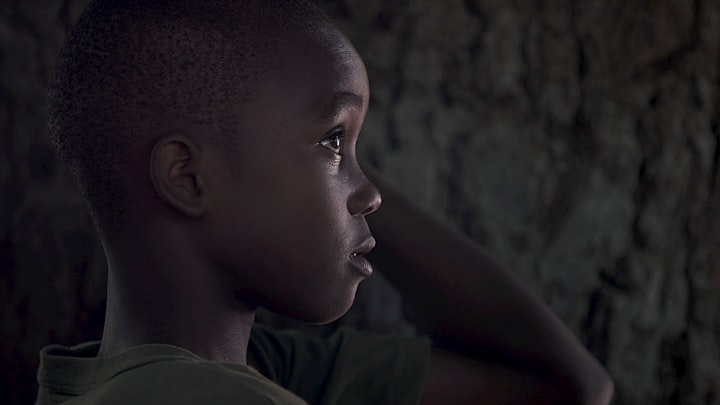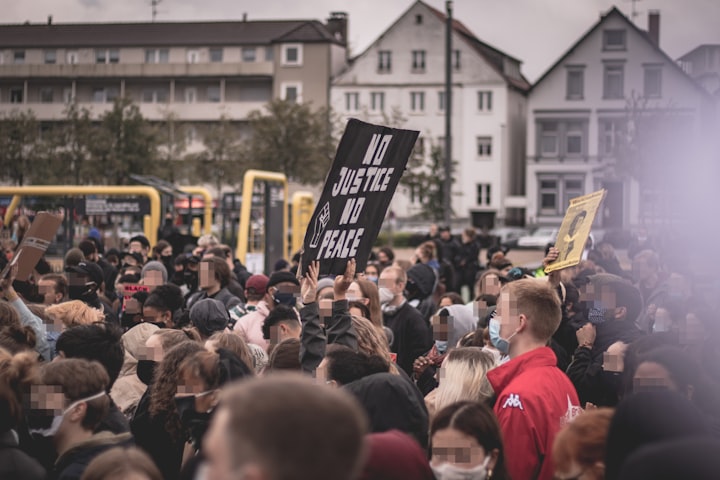Why the "African Booty Scratcher" Stereotype Is Worse Than Just Schoolyard Bullying
African kids being bullied in American schools is a much bigger issue than many people make it out to be

In the U.S., bullying is a big problem in schools. Kids across the country get bullied for an unlimited number of reasons: not wearing the right clothes, having speech impediments, being a girl that's too masculine or a boy that's too feminine, and unfortunately as long as we're all human, bullying will always occur at some level. But while all bullying is bad, not all bullying holds the same weight because the implications of all forms of bullying are not the same. And for (Black) African kids in particular, school can be the breeding ground for a lifelong battle against xenophobia.
As an African kid, I experienced occasional bullying for simply being African. Hearing people click their tongues at me nonsensically to imitate what they thought all Africans talk like, being asked if my mother lived in a hut, and the infamous insult - being called an "African booty scratcher." And unfortunately, most of the bullying came from other Black kids.
I was more fortunate than many African kids, however, because I didn't exhibit the typical physical attributes that people associate with Africans, such as dark skin. And because I was born in the U.S., I didn't have an accent. Because of that, people only knew that I was African if I told them or if they heard my mother speak. For many African kids though, they don't have the privilege of being able to hide their Africaness, making them a target from the time their classmates look at them.

Power Dynamics & Privilege
A major part of what makes the bullying of African kids for their Africaness worse than something like bullying someone for wearing socks with sandals is how this kind of bullying is a direct result of power dynamics. Within the U.S., African immigrants and the children of African immigrants are typically considered more privileged than African Americans (while still being less privileged than non-Black people). And while this is true in some cases, such as when it comes to career opportunities (though there are differences when looking at people from individual African countries), when it comes to peer relations in the U.S., children who are American-born and come from American-born parents have the upper hand. This is because in the U.S., "Americaness" is considered the default or the norm and being born to foreign parents, automatically goes against that norm.
When bullying is based on power dynamics, it is no longer just bullying, it becomes discrimination. This is the same reason why white kids bullying non-white kids, abled kids bullying disabled kids, and straight kids bullying gay kids for those things that make them different also have deeper ramifications than the inverses of these situations. And when American-born kids who have American-born parents bully African kids for their differences, it becomes more than just bullying, it is xenophobia.

Xenophobic Kids Become Xenophobic Adults
When talking about the bullying of African kids growing up, many people dismiss it as typical schoolyard behavior that comes with childhood immaturity. While some people grow up and learn from their mistakes, many people never address their mistakes and so xenophobic kids grow into xenophobic adults, just changing the language of it. Most adults know that calling someone an African booty scratcher or clicking their tongues at someone for no reason, is inappropriate. So adults who did these things as kids, realize not to do it as they grow older and think that because of these changes, they're no longer xenophobic. But often, their xenophobia just presents itself in other ways.

They may not call someone an "African booty scratcher" but they may associate African features or African names with ugliness.
They may not ask if Africans live in huts but they may be wary of Africans because they think Africans carry certain diseases like AIDS or ebola or malaria.
They may not click their tongue at Africans when they speak, but they may take on a generic "African accent" when they imitate Africans that sounds nothing like how they actually speak.
They may not tell an African to go back where they came from, but they may carry this idea that Africans are impeding their progress in some way by occupying American spaces.
They may even love and respect African culture, but it doesn't mean that they love and respect African people. And that is how xenophobia transforms itself from something blatant and aggressive to something subtle and disguisable.
Colorism: The Lovechild of Xenophobia

On many occasions, I've heard colorism being described as a byproduct of racism and it is true, but I also think that racism and colorism are both byproducts of xenophobia. Colorism exists because racism exists and racism exists because xenophobia exists. Centuries ago, in a world where people lived among other people who generally looked the same as them, there was only xenophobia. And as people expanded into the world and met others who looked vastly different, the xenophobia turned into racism and racism turned to colorism when darker people were deemed inferior to everyone else.
I also believe that part of the reason that darker skinned Black people were treated worse than lighter skinned Black people during American slavery is because those coming straight from Africa tended to be darker than those whose lineage had been in the U.S. for awhile and were more likely to have some white blood in them. While this idea isn't one that I have seen many people do extensive research on, certain historical accounts, such as the history of Liberia hints at this being true. Liberia, an African nation that was founded by freed Black people from the United States, developed a caste system that put African natives (who were mostly darker skinned) at the bottom of society and the Black American settlers (who were mostly lighter skinned in comparison) at the top of society. This class division between native Africans and American-born Black people can hint at the fact that enslaved people coming directly from Africa were probably also treated differently than those who were born on American soil, while they were in the United States.

Because being African is still often associated with dark skin, many people who aren't even first or second generation Africans have gotten caught in the crossfire of people's xenophobia through colorism. Many dark skinned African Americans were called the same names as African kids growing up, all because of this idea that being dark meant that they were somehow "other" and therefore inferior, just the way that African kids were. So the bullying of African children at first glance may just appear as one of those things that kids do out of immaturity but it's much more problematic than that and has lasting affects on not only how African people are treated and looked at within the Black community, but also how darker skinned Black people in general are treated and looked at within the Black community.
It's Not Just Kids Being Kids
Xenophobia and colorism are not things that should be brushed aside as just kids being kids. Kids should be held accountable and corrected when they say or do problematic things. And that starts with making adults who exhibited these behaviors as kids, recognize the problems with it and actually do the work of learning and reconciling with the groups of people who were targeted by it so that they are not passing these toxic behaviors on to others.
About the Creator
C.R. Hughes
I write things sometimes. Tips are always appreciated.






Comments
There are no comments for this story
Be the first to respond and start the conversation.